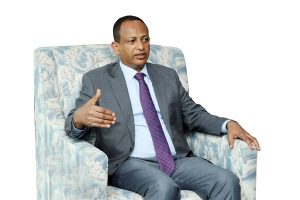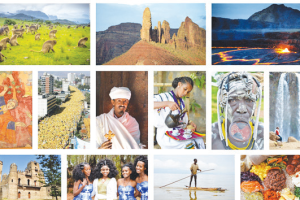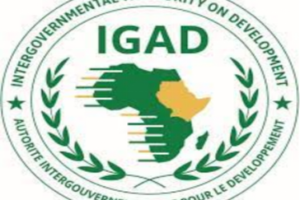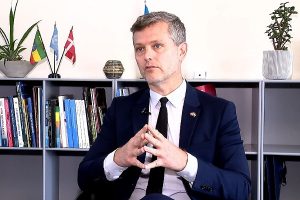
The Ethiopian New Year celebrations in the capital Addis Ababa in particular had two different faces. On the one hand there were celebrations at the higher levels; music was in the air starting from the eve of the New Year at five-star hotels and other avenues.
The Jubilee Palace has hosted the country’s political, business and cultural dignitaries or elites for the first time in many years. The National Theatre tried to reenact its past and lost grandeur by reminiscing about the good old days of glory under the last emperor. Old songs were sung by aging and nostalgic artists.
There was a big music show at the Ghion Hotel where members of the moneyed middle class enjoyed the eve of the New Year with music, drinks and lavish foods. An unprecedented display of fireworks took place in the center of the city and Sheraton Hotel rediscovered its previous glamour and ritual that was ignored in the last few years.
The flip side of all this light, glamour and fireworks was somewhat darker because if inflation and unemployment. Many people in the low-income bracket have been complaining about the inflation, the rising cost of basic commodities like cooking oil and food in general, fowls sheep and butter most of the have-nots could barely afford.
The mood was more somber in the shanty towns of the capital Addis Ababa where residents started to frequent alehouses and beer joints on the eve of the New Year as if they wanted to drown their miseries in drink-induced merry making.
If there was one factor that bound the haves and the have-nots of the capital Addis Ababa together on the eve of the new and even earlier, it was their concern for the state of the nation, that means obviously the absence of peace and stability in some parts of the country the that had been rocking the nation in the outgoing Ethiopian year.
In the state media, most of the coverage was bout peace or the urgent need for stability. Talk show hosts and guests talked about the need to secure peace in the new Ethiopian year. In the language of most talk show guests, “Peace is everything for Ethiopians at this moment.
It is the most indispensable single asset that creates hope in the future. Nothing good will happen without peace. Peace is the foundation of our existence” Most of them expressed their hopes for peace in the New Year and wished one another a year of stability and prosperity so that talks of conflicts and misunderstandings would soon vanish public memory.
Comparative data suggests that more than 4000 Ethiopians have died of traffic accidents in the just-ending Ethiopian year. On the other hands, although there is no solid evidence as to the victims of mob violence and ethnic conflicts, most people seem to agree that there were dozens, maybe hundreds of deaths and the dark specter of an attempted coup four months earlier in which some of the best military officers of the country lost their lives and that event created a mood of uncertainty and political volatility across the nation.
As we said above, traffic accidents were the biggest killers in Ethiopia last year and that is a sad fact that disturbed many people. Yet, the traffic accidents and the resulting fatalities paled in comparison to public concern for peace.
They did not claim the headlines as much as the vibrant national passion for peace and stability. There was a palpable collective feeling of angst, equivocation and deep concern in the opinions expressed by the residents of Addis Ababa. Come what may, and despite the differences in lifestyles and incomes, all the residents of the capital were untied around the single topic of peace. Both their anxiety and hope generally represent similar feelings across the nation.
But why worry about peace at this particular time?
The answer to this question is quite obvious. The country is finding itself at a very critical crossroads in its recent history. The New Year in particular marks the beginning of a new or a renewed political experiment. The year 2020 (2012 in Ethiopian calendar) represents the time for holding elections that are expected by many as the defining moment of the country that had lost similar opportunities in the past.
This year is considered the culmination of the long democratic quest that started some 46 years back at the dawn f the February 1974 Ethiopian Revolution. Since then, the nation has passed through many difficult stages without being able to fulfill the expectation or the democratic aspirations that were born of the revolution. In the meantime, wars in the north and famines almost across the entire length and breadth of the nation had compounded the unnecessary sufferings and the destructions that occurred for decades.
The year 1991 (1983 in Ethiopian calendar) had also created new hopes that were dashed and the last 28 years that followed had been both extremely disappointing although undeniable economic gains had been registered here and there. The overall feeling however remained that of missing the democratic train that had started its journey back in 1974 and then in 1991.
Meanwhile, 2005 (1997 in Ethiopian calendar) had created another opportunity for genuine freedom as the train of democracy travelled without passengers heralding yet another defeat for the nation, followed as usual by tormenting moments for most of the characters in the drama who played the key roles in what is known as ‘the first genuine attempt to bring about the birth of a genuine democracy’. What followed was however an attempt to roll back the gains of the earlier experiments that led to many avoidable mistakes.
Democracy has a way of punishing those who abuse it or fail to live to the expectations. Democracy has to be born healthy or suffer from some pathological complications that result from the careless handling of the birth pangs. If there is any practical lesson that could be drawn from the 2005 failed democratic attempt, it is the fact that democracy abhors violence and repression.
Democracy will not be born where violence is the rule of the game. The tender offshoots of democracy need careful tending, careful handling and patience and delicate handling if they are expected to grow into fruit-bearing trees. As you cannot force a newborn baby to be born or grow before its time by artificial means, you cannot force democracy to grow with the barrel of the gun. And now after 28 years of hiatus, the baby of democracy is expected to come out alive and healthy. Every party is promising to make the birth pangs peaceful.
The government is expressing its commitment to let the baby of democracy be born as scheduled. This is one great reason for Ethiopians to be concerned about the need for peaceful handling of political contradictions. They have still vivid memories of 2005 and its aftermath. As Karl Marx used to say, history repeats itself once as a tragedy and another time as a farce. It is not clear yet whether 2020 would prove another farce as it repeats 2005. Many people however look determined to make it a healthier experiment this time around.
That is apparently why most people are concerned about the need to preserve peace as a top priority in this election year. They don’t want a repeat of 2005 although deep down they know that they had been cheated and abused several times in the past, all in the name of democracy. Their worries and concerns however are justified. Their hopes are legitimate. This is a situation once described by Italian philosopher Antonio Grmsci who described such a situation as “pessimism of the intelligence and optimism of the heart”.
The second reason for the current quest for peace and stability emanates from the very history of the nation. As many people agree, Ethiopian history in the 20th century was replete with conflicts, wars and crises that were interspersed with periods of calm that are soon shattered by new rounds of hostilities that left much f the country in state of ruins.
The, collective memory of Ethiopians in all walks of life is that of a nation that had been long suffering from the ravages of civil wars, external aggression and power struggles that often led to chaps and untold torments.
The people of Ethiopia have now a last chance to end this shaming chapter of their history and make a fresh beginning without the violence and political intrigues of the past. They have experienced many disappointments in the past and can no more tolerate another one.
There is much talk about national survival these days. Whenever people think about national survival, they seem to think about it in terms of survival with dignity, democracy and justice. Will 2020 deliver this long-cherished dream and not turn into another nightmare? Only time will tell and the coming eight or nine months will certainly prove decisive.
The third factor that makes Ethiopians so fixated on the need for the restoration peace and stability is because of the prevalence of a feeling of mistrust or suspicion everywhere as the transition period enters its most critical phase. This is largely because there is no precedence in true and honest democratic gestation. The political actors, including the ruling party as well as the entire political class has been psychologically tormented by the tragic events of the just-ended Ethiopian year or those of last three or four years.
Almost everybody in Ethiopia has been affected by these events. They have therefore a stake in fighting for peace or restoring stability where it has been lacking at this particular time. That is why they are now passionate about peace that has become an existential issue.
It is also the harbinger of true democracy if at all that is going to be born healthy in May 2020 as planned. As the people deserve the New Year celebrations, they also deserve the peace they are passionately expecting in the New Year. Fortunately for them, peace is an undying quest despite temporary setbacks. The birth of true democracy has never been a garden party for any people anywhere in the world.
The Ehtiopian Herald Sunday Edition 22 September 2019
BY MULUGETA GUDETA





